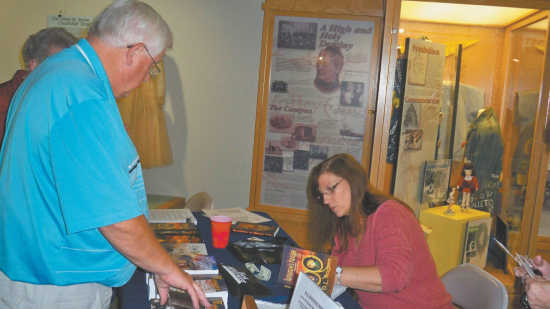NEWS
Civil War historian uncovers real story
BY JESUS LOPEZ-GOMEZSpecial to the DemocratMay 11, 2016
Writer says works are historically accurate, politically incorrect

Special to the Daily Mail
It was seeing the movie "Dancing with Wolves" and the lure of the sweeping Great Plains with its cowboys and Indians and battles that got author Diane Rogers started writing historical fiction about the Civil War.
| "History is what it is, and not what people would like it to be," the flamboyant author told a crowd Sunday at the Bushwhacker Museum attending the quarterly meeting of the Vernon County Historical Society. "My books are not politically correct." |
But they are historically accurate. Before her copy is turned into a published work, Rogers has it reviewed by historians and experts. She learned, for instance, from a Civil War authority that Union soldiers carried carbines and not rifles.
| Rogers, whose pen name is D.L. Rogers, started her books as a trilogy before the Civil War on the Oregon Trail, continuing on to the Missouri Border War, the battles of Wilson's Creek and Lexington, touching on Order No. 11 in Missouri, through the Indian wars to the Massacre at Wounded Knee in 1890. |
Of her seven novels, the imaginative writer counts only one as a romance, "The Journey," following the adventures of three young ladies in Europe.
Three others are spinoffs of her original trilogy about the war.
"Caleb" is a slave finding love and freedom; "Amy" is a young girl who lived through the tumultuous period, and "Maggie," the latest work, "is me," Rogers says.
| "She is a 'forward-thinking' woman who can out-ride, out-shoot, and out-do most of her male counterparts as she travels the west from Boston to Cheyenne to Deadwood, working to make a positive difference in her world." |
A small book publisher, Rogers admits she isn't able to make a fortune with her sales, but she loves writing and reading history, "and taking my characters anywhere I want them to go.
| "There'll be more novels," she says. "My readers won't let me quit." |
The mother of two grown children and grandmother of two, Rogers works as a legal assistant for a Kansas City law firm on the Country Club Plaza and lives with her husband and four horses on a 14-acre spread in Archie.
Her e-mail address is: www.dlrogeresbooks.com.


